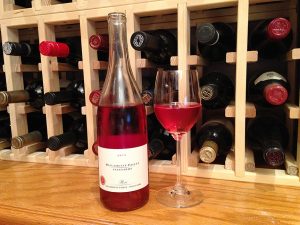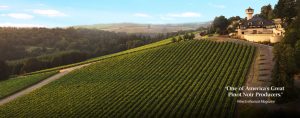Rosy-pink color; strawberry on the nose; watermelon, strawberry, tangerine on the palate. Very dry, medium body, nice acidity, hint of sour cherry on the finish, at least on the first pour—it mellows with some air time. Very clean. Substantive rosé, not a soda pop wannabe wine (the opposite, in fact).
The Willamette Valley is natural pinot noir country. Cool climate. Dry in the summer, protected by looming mountains. Oregon is the third largest wine producer in the U.S., behind California and Washington State. The Willamette Valley stretches for 150 miles south of Portland and is steadily earning respect as one of the great pinot noir appellations/viticultural areas on Earth.
Willamette Valley Vineyards owner Jim Bernau has been at it since 1983, making him one of the founding pioneers of Oregon wines, especially pinot noir. Willamette Valley Vineyards is one of the state’s largest operations—a large operation by Oregon standards. WVV is not a wine factory and WVV vineyard-specific and technique-specific offerings consistently deliver distinctive quality and value; they are not focus-group driven to fill a demographic niche on a supermarket shelf. The winery also is passionate about environmental responsibility. Since 1997, WVV has been certified sustainable through LIVE (Low Input Viticulture and Enology—the international standard for sustainable agriculture) and Salmon-Safe.
In another initiative, WVV is a pioneer in “raptor rehabilitation” of barn owls and kestrels (North America’s smallest falcon). Washington has a steady supply of barn owl and kestrels because the birds nest in places disrupted by normal farming activities (hay stacks, for instance), and the Cascades Raptor Center and other agencies rescue hundreds of wild chicks. WVV places bird houses in trees around the vineyard to help control the mice population. Mice are a pest in vineyards because they burrow and harm root systems. Barn owls are voracious mice eaters, consuming four or five a night, even more if they are raising young. The owls primarily hunt by sound, making them super mousers even on the darkest nights or over ground covered with snow. WVV’s embrace of organic farming means there is better chance for the birds to avoid chemicals used in conventional farming. As many of you know, I have special place in my heart for grape farmers who embrace Mother Nature instead of the chemistry lab. I think you can taste the difference in the wine, but even if you can’t, it makes you feel better drinking it. $24
Willamette Valley Vineyards website
Second photo: Willamette Valley Vineyards


